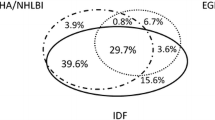Abstract
Objectives:
We aimed (1) to construct a modified PROCAM risk algorithm, which incorporates BMI/waist circumference in a model for predicting coronary events; (2) to evaluate how accurate this and the previously established PROCAM risk algorithm predict coronary risk in individuals with metabolic syndrome.
Design:
Prospective Cardiovascular Münster (PROCAM) Study, a prospective study of men and women at work in the northwest of Germany.
Subjects:
A total of 7134 men aged 35–65 years at study entry.
Measurements:
On the basis of 404 major coronary events (defined as nonfatal MI and coronary deaths), which occurred within 10 years of follow-up, a modified PROCAM risk algorithm was constructed by incorporating BMI/waist circumference as fixed variable in a Cox proportional hazards model for predicting coronary events. The metabolic syndrome was defined according to the latest recommendations proposed by the NCEP-ATP III Panel.
Results:
Men who were classified as having the metabolic syndrome (n=2325, prevalence: 32.6%) were 2.59-fold more likely to experience a major coronary event within 10 years of follow-up than men not having the metabolic syndrome. In men with metabolic syndrome, the observed major coronary event rate of 9.6% corresponded well with their estimated global risk according to the modified BMI-based PROCAM risk algorithm (10.2%). Comparative calculations performed with the previously published fully adjusted PROCAM algorithm yielded very similar results.
Conclusion:
Both PROCAM algorithms provide very accurate means to ascertain coronary risk in male patients with metabolic syndrome.




Similar content being viewed by others
References
Leal J, Luengo-Fernandez R, Gray A, Petersen S, Rayner M . Economic burden of cardiovascular diseases in the enlarged European Union. Eur Heart J 2006; 27: 1610–1619.
Flegal KM, Carroll MD, Ogden CL, Johnson CL . Prevalence and trends in obesity among US adults, 1999–2000. JAMA 2002; 288: 1723–1727.
Ford ES . Risks for all-cause mortality, cardiovascular disease, and diabetes associated with the metabolic syndrome: a summary of the evidence. Diabetes Care 2005; 28: 1769–1778.
Eckel RH, Grundy SM, Zimmet PZ . The metabolic syndrome. Lancet 2005; 365: 1415–1428.
Olshansky SJ, Passaro DJ, Hershow RC, Layden J, Carnes BA, Brody J et al. A potential decline in life expectancy in the United States in the 21st century. N Engl J Med 2005; 352: 1138–1145.
Grundy SM, Cleeman JI, Daniels SR, Donato KA, Eckel RH, Franklin BA et al. Diagnosis and management of the metabolic syndrome: an American Heart Association/National Heart, Lung, and Blood Institute Scientific Statement. Circulation 2005; 112: 2735–2752.
Alberti KG, Zimmet P, Shaw J . The metabolic syndrome—a new worldwide definition. Lancet 2005; 366: 1059–1062.
Assmann G, Guerra R, Fox G, Cullen P, Schulte H, Willett D et al. Harmonizing the definition of the metabolic syndrome: comparison of the criteria of the Adult Treatment Panel III and the International Diabetes Federation in United States American and European populations. Am J Cardiol 2007; 99: 541–548.
Despres JP, Lemieux I . Abdominal obesity and metabolic syndrome. Nature 2006; 444: 881–887.
Assmann G, Cullen P, Schulte H . The Munster Heart Study (PROCAM): results of follow-up at 8 years. Eur Heart J 1998; 19: A2–A11.
Cullen P, Schulte H, Assmann G . The Münster Heart Study (PROCAM): total mortality in middle-aged men is increased at low total and LDL cholesterol concentrations in smokers but not in nonsmokers. Circulation 1997; 96: 2128–2136.
Assmann G, Cullen P, Schulte H . Simple scoring scheme for calculating the risk of acute coronary events based on the 10-year follow-up of the prospective cardiovascular Munster (PROCAM) study. Circulation 2002; 105: 310–315.
Assmann G, Schulte H . Results and conclusions of the Prospective Cardiovascular Münster (PROCAM) Study. In: Assmann G (ed). Lipid Metabolism Disorders and Coronary Heart Disease. MMV Medizin Verlag: München, 1993, pp 19–68.
Anderson PJ, Critchley JA, Chan JC, Cockram CS, Lee ZS, Thomas GN et al. Factor analysis of the metabolic syndrome: obesity vs insulin resistance as the central abnormality. Int J Obes 2001; 25: 1782–1788.
Carr DB, Utzschneider KM, Hull RL, Kodama K, Retzlaff BM, Brunzell JD et al. Intra-abdominal fat is a major determinant of the National Cholesterol Education Program Adult Treatment Panel III criteria for the metabolic syndrome. Diabetes 2004; 53: 2087–2094.
Nakamura T, Tokunga K, Shimomura I, Nishida M, Yoshida S, Kotani K et al. Contribution of visceral fat accumulation to the development of coronary artery disease in non-obese men. Atherosclerosis 1994; 107: 239–246.
Bonora E, Kiechl S, Willeit J, Oberhollenzer F, Egger G, Targher G et al. Prevalence of insulin resistance in metabolic disorders: the Bruneck Study. Diabetes 1998; 47: 1643–1649.
Nesto RW . The relation of insulin resistance syndromes to risk of cardiovascular disease. Rev Cardiovasc Med 2003; 4: S11–S18.
Galassi A, Reynolds K, He J . Metabolic syndrome and risk of cardiovascular disease: a meta-analysis. Am J Med 2006; 119: 812–819.
Author information
Authors and Affiliations
Corresponding author
Rights and permissions
About this article
Cite this article
Assmann, G., Schulte, H. & Seedorf, U. Cardiovascular risk assessment in the metabolic syndrome: results from the Prospective Cardiovascular Munster (PROCAM) Study. Int J Obes 32 (Suppl 2), S11–S16 (2008). https://doi.org/10.1038/ijo.2008.29
Published:
Issue Date:
DOI: https://doi.org/10.1038/ijo.2008.29
- Springer Nature Limited
Keywords
This article is cited by
-
Hypertriglyzeridämie verstehen
Der Kardiologe (2021)
-
Screening results for subclinical coronary artery calcification in asymptomatic individuals in relation to a detailed parental history of premature coronary heart disease
European Journal of Epidemiology (2013)
-
Prediction models for risk classification in cardiovascular disease
European Journal of Nuclear Medicine and Molecular Imaging (2012)
-
Functional body composition: insights into the regulation of energy metabolism and some clinical applications
European Journal of Clinical Nutrition (2009)




